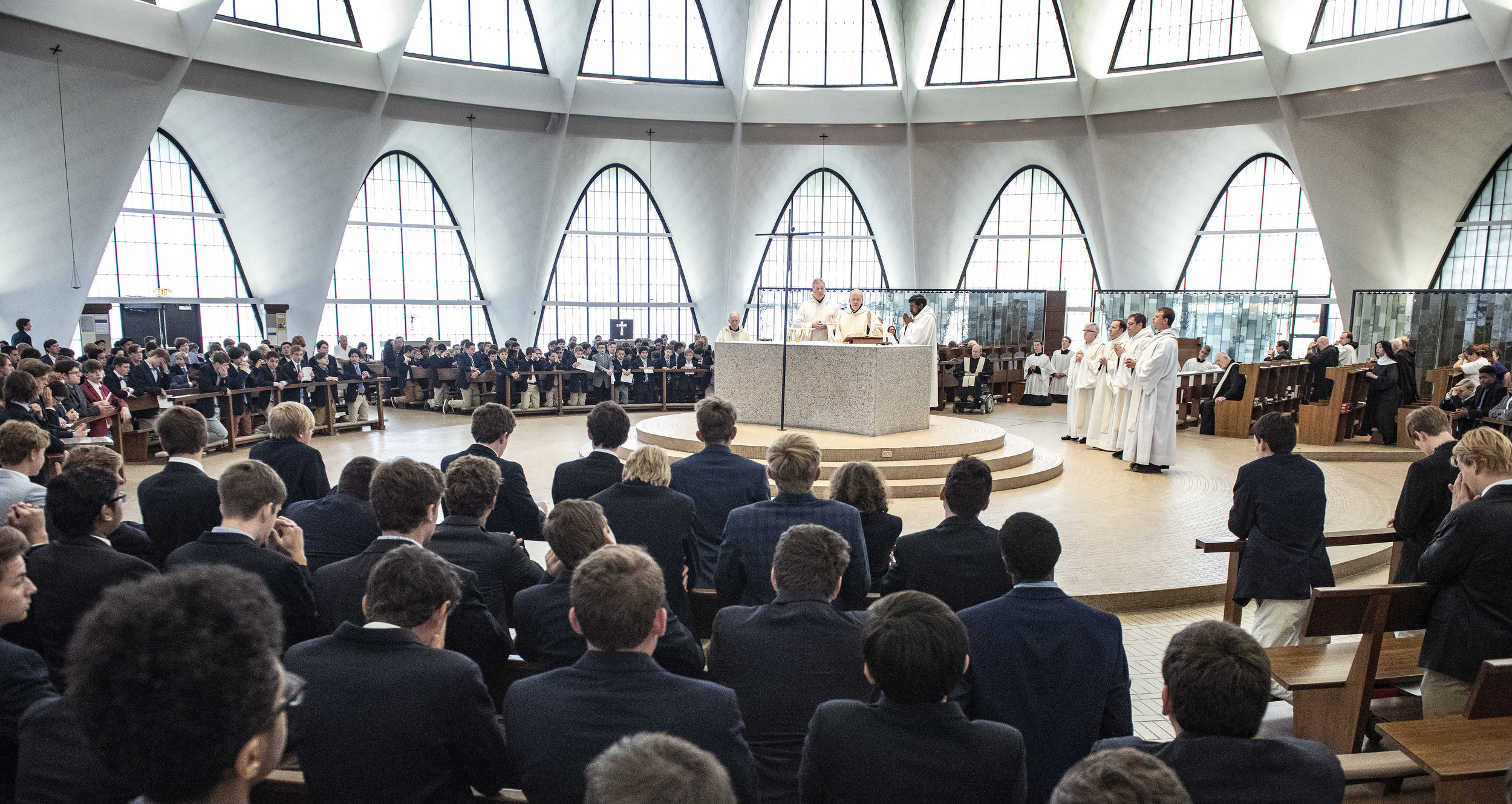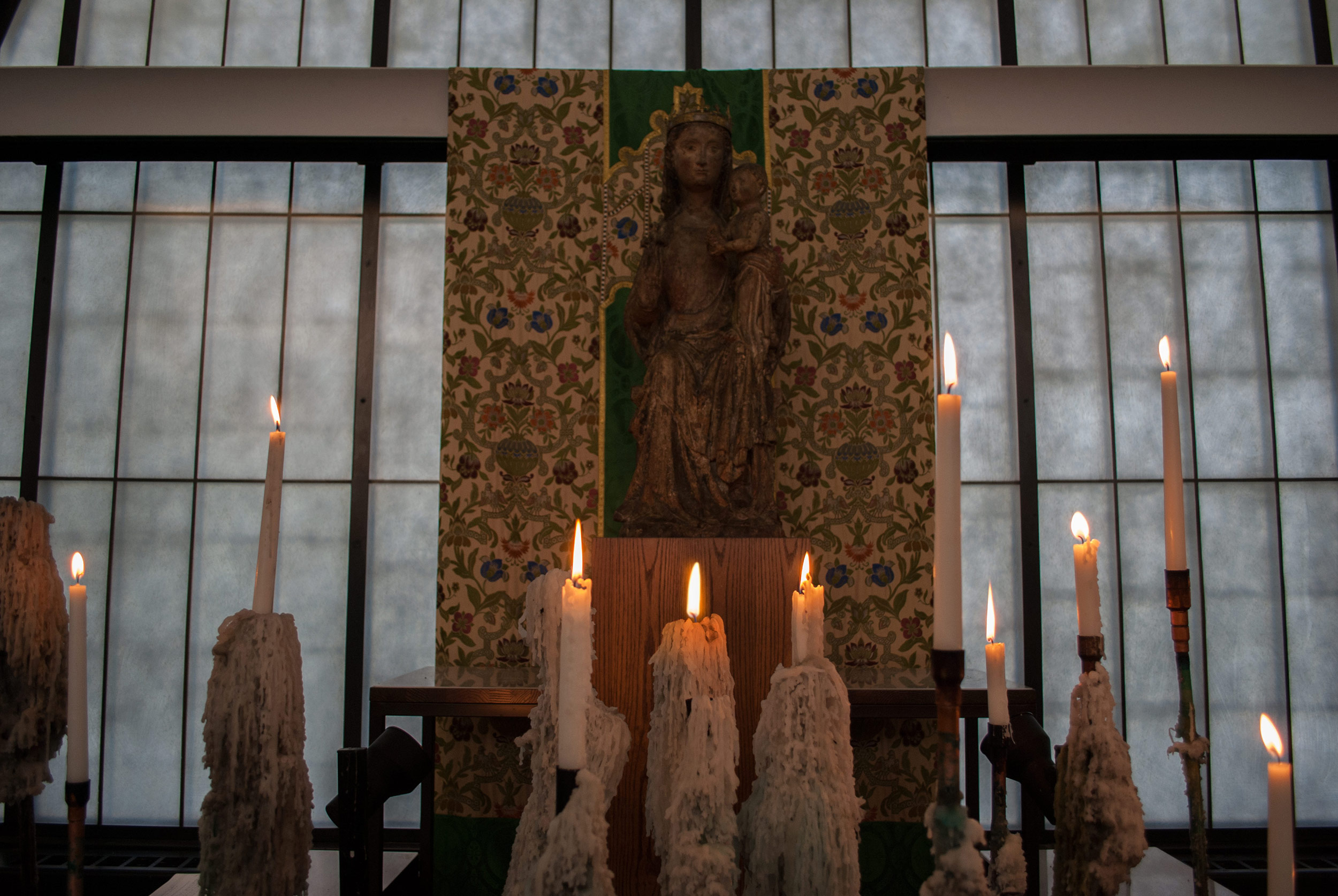
Prayer is "the lifting of the mind and heart to God." The life of a monk is thoroughly ordered to God as his ultimate goal and prayer as the means to Him.
Every day begins with prayer. In the morning before dawn, we pray Vigils and then have a half hour for mental prayer. Four more times throughout the day we gather to offer the prayer of Christ and His Mystical Body, the Church. The Divine Office (the opus Dei or work of God) is the worship we give to God as His due. The high point of each day is the Holy Sacrifice of the Mass: the “Source and Summit of the Christian life” (Lumen Gentium, 11) to which everything else is a preparation and from which flow the graces necessary to live a holy Monastic life. The Monastic life is a vow of fidelity to the prayer of the Church, to personal prayer, to the worship of God in justice and to filial love. The growth in holiness for the monk himself and the sanctification of the Church flow as a necessary consequence of this fidelity.
“Let nothing be preferred to the work of God”

The Holy Sacrifice
of the Mass
* * *
Participation in the Holy Sacrifice of the Mass is the pinnacle of Christian prayer. It makes present Christ's Sacrifice of the Cross in an unbloody and sacramental way, in order to offer it to the Eternal Father in atonement for the sins of the world, and apply the merits of that same sacrifice to those present and to the whole world. The Church describes it as follows:
"At the Last Supper, on the night he was betrayed, our Savior instituted the Eucharistic Sacrifice of his Body and Blood. He did this in order to perpetuate the sacrifice of the cross throughout the centuries until he should come again, and so to entrust to his beloved spouse, the Church, a memorial of his death and resurrection: a sacrament of love, a sign of unity, a bond of charity, a paschal banquet in which Christ is consumed, the mind is filled with grace, and a pledge of future glory is given to us" (Sacrosanctum Concilium 47).
Traditionally, monasteries have been places where the Sacred Liturgy is celebrated with special solemnity and beauty. At Saint Louis Abbey, we humbly seek to carry on this noble practice. We sing the Latin Gregorian chant for the Ordinary of our festal Masses, as well as the Latin Gregorian chant Introit and Offertory Propers on Sundays and feast days. We use the English plainchant Introits and Responsorial Pslams which have grown organically from the chant tradition of the Church, and which were composed at Ampleforth, our motherhouse in England. We have a team of well-trained and disciplined servers from our school for our Sunday and festal liturgies, as well as fine vestments commissioned especially for our use. We attempt to follow the mind of the Holy Father, Benedict XVI, in his call for a renewal of the sacredness and solemnity of the Church's Liturgy in our time.
Saint Louis Abbey chants Vespers in Latin every day of the week.
The Divine Office
* * *
The Divine Office, along with the Holy Sacrifice of the Mass, is the prayer of the Church. This is the prayer of Christ the Head joined to His Members, which is His Mystical Body. The heart of that prayer is the Psalms. In these ancient prayers we join the Sacred Heart of Jesus Christ worshipping God the Father. We offer worship, thanksgiving, praise, and reparation on behalf of the world to the Eternal Father, and in so doing render to God that worship which is His due, and which can only be perfected when joined to the prayer of Christ. To be able to participate in this prayer is an awesome privilege.
In his Rule, Saint Benedict refers to the Divine Office as the Work of God, the Opus Dei. Along with the Holy Sacrifice of the Mass, the Divine Office is the monks’ most important work. It is so highly regarded that Saint Benedict says, “Nothing is to be preferred to the Work of God” (43:3). In this divine Work we worship God and intercede for all souls living and deceased.
The Divine Office at Saint Louis Abbey occurs five times daily. The prayer marks the hours of the day, helping us take the first step towards obeying the Apostle's exhortation to "pray without ceasing" (1 Th 5:17). Please join us. If you arrive early, a monk can help you navigate the books.
Horarium
* * *
Saturday and Sunday
Rise 0550
Vigils 0610
Meditation
Lauds 0815
Holy Mass 0845 (Sunday 0900)
Sext 1145
Vespers 1815 (Sunday 1730 with Benediction)
Compline (Private)
Grand Silence 2200
Monday through Friday
Rise 0515
Vigils 0530
Meditation
Lauds 0655
Sext 1145
Holy Mass 1730 (Friday 0845)
Vespers 1815
Compline 1930
Grand Silence 2200
The Psalmist sings, “Seven times a day I will praise you.” (Psalm 118:164) Since the days of the Desert Fathers in the second century, monks have centered their lives on prayer and work. Throughout the day, monks turn from their labor to refocus themselves on God before returning to the labor of their hands by which they earned their daily bread.
The monks of Saint Louis Abbey are no different from their forefathers in the monastic life. Each day begins with our turning to God at the Office of Vigils (the first hour of the Divine Office) as we sing, “Lord, open my lips and my mouth shall declare your praise.” In fact, the first words out of our mouths each day give glory to God. Approximately twenty minutes before Vigils, one of the brethren knocks on the doors of the cells of each of the monks and says, “Benedicamus Domino (Let us bless the Lord).” To which each responds, “Deo gratias (Thanks be to God)!” This sets the tone and rhythm of our day in that all that we do.
The texts which comprise the prayers of the Divine Office come directly from the Book of Psalms, as well as the various books of the Old and New Testaments, and the writings of orthodox and Catholic authors spanning two millennia of Christianity.
Throughout the day, whether it be for the Divine Office or the Holy Sacrifice of the Mass, the bells in the tower of the Abbey Church call the monks to prayer as a reminder of where our attention should be. In a sense, the peal of the bells calling us to prayer reminds us that it is Jesus who is calling us to Himself, to spend time with Him, so that we may be fortified in order that we may once again go forth to do the work that He has called us to.
For Saint Benedict, the Liturgy – the Opus Dei (the Work of God) – is of such importance, that he writes in his Rule, that, “nothing is to be preferred to the Work of God.” (RB1980 43.3) Fundamentally, this is underscored in the penultimate chapter of the Holy Rule where we read, “Let them (the monks) prefer nothing whatever to Christ, and may He bring us all together to everlasting life.” (RB1980 72.11)
“Prayer ought to be short and pure, unless it be prolonged by the inspiration of Divine grace”





